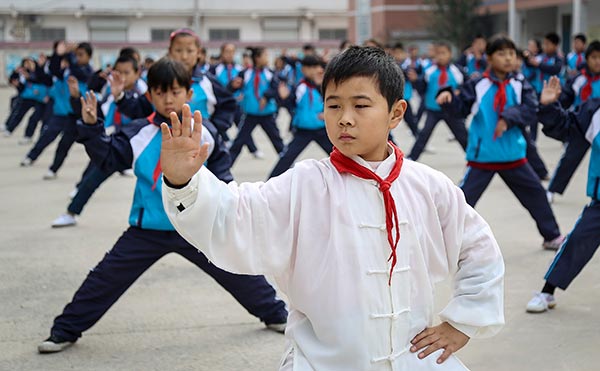
An elementary school student practices tai chi during a break in 2015 in Wenxian county,Henan province, where tai chi classes have been offered since 2001. XUHONGXING/CHINA DAILY
For residents of Chenjiagou village, the birthplace of tai chi, a more than 10-year wait tosee the martial art recognized globally as intangible Chinese heritage could soon be over.
China has nominated tai chi for inclusion in the UNESCO List of Intangible CulturalHeritage, with a final decision to come late this year.
The application, made by Wenxian county in Henan province, has been in the making since2006, when the country drew up its first national intangible heritage list and included taichi, said Zheng Aizhen, chairman of the Wenxian committee of the Chinese People'sPolitical Consultative Conference, the country's top policy advisory body.
"For the past decade, we have collected materials, gathered a lot of masters and expertstogether to discuss tai chi culture and tried to restore the centuries-old history of tai chi,"Zheng said. "As a precious traditional Chinese legacy, we all have a responsibility to protectit."
China attempted to get UNESCO status for the martial art in 2008, but the application-oneof 35 from China that year-was withdrawn after an evaluation deemed it "too vague",according to a Wall Street Journal report.
The next year, the rules were changed to limit nations to only two nominations, which forChina were Peking Opera and acupuncture. Both went onto make the list.
The latest attempt to include tai chi comes amid speculation that South Korea and Japancould make similar nominations.
Zhang Liyong, a deputy to the National People's Congress, the country's top legislature,and president of the Henan High People's Court, said that the situation is urgent: "BothSouth Korea and Japan were trying to get tai chi registered. South Korea has alreadyregistered the Dragon Boat Festival as theirs, so we should be alarmed."
He was referring to the decision by UNESCO to grant intangible heritage status to theGangneung Danoje Festival in 2008, which caused anger among some Chinese, who arguedthat the event is derived from the Dragon Boat Festival and accused the United Nations ofendorsing South Korea's appropriation of Chinese culture. UNESCO added the Chinesefestival to the list in 2009.
Chen Xiaowang, a tai chi master, said claims that tai chi was invented in Korea are based ona fictional character from a kung fu novel by Hong Kong writer Louis Cha. He said themartial art's history can be traced to creator Chen Wangting in the mid-17th century.
"If we fail again in our application, or if it is registered by South Korea, it will be a greatpity," Chen said.
Zhu Xianghua, 40, the son of tai chi master Zhu Tiancai, said he feels a growing duty toprotect tai chi culture. "It is not just a traditional activity; it is deeply rooted in many areasof Chinese culture, such as medicine, aesthetics and mechanics," Zhu said.

